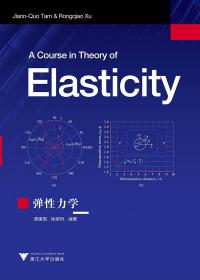
弹性力学
¥ 57.26 8.4折 ¥ 68 九五品
仅1件
河北廊坊
认证卖家担保交易快速发货售后保障
作者谭建国 著
出版社浙江大学出版社
出版时间2019-07
版次1
装帧平装
货号A21
上书时间2024-12-12
- 在售商品 暂无
- 平均发货时间 13小时
- 好评率 暂无
- 最新上架
商品详情
- 品相描述:九五品
图书标准信息
- 作者 谭建国 著
- 出版社 浙江大学出版社
- 出版时间 2019-07
- 版次 1
- ISBN 9787308186681
- 定价 68.00元
- 装帧 平装
- 开本 16开
- 纸张 胶版纸
- 页数 348页
- 字数 748千字
- 【内容简介】
- 主要内容包括笛卡尔张量、应力理论、应变分析、弹性力学本构关系、弹性力学问题的一般理论、平面问题的直角坐标解法和极坐标解法、柱形杆的扭转和弯曲、空间问题和接触问题、热应力、弹性波的传播、弹性力学问题的复变函数解法、弹性力学问题的变分解法等。
- 【作者简介】
-
谭建国美国杜克大学(duke univerity)土木工程系博士,台湾成功大学土木工程系讲座教授、浙江大学建筑工程学院土木系客座教授,中科院航发中心应力分析组教授顾问,中国土木水利工程 - 【目录】
-
Chapter 1 Mathematical Prerequisites
1.1 Index Notation
1.1.1 Range convention
1.1.2 Summation convention
1.1.3 The Kronecker delta
1.1.4 The permutation symbol
1.2 Vector Operations and Some Useful Integral Theorems
1.2.1 The scalar product of two vectors
1.2.2 The vector product of two vectors
1.2.3 The scalar triple product
1.2.4 The gradient of a scalar function
1.2.5 The divergence of a vector function
1.2.6 The curl of a vector function
1.2.7 Laplacian of a scalar function
1.2.8 Divergence theorem (Gauss's theorem)
1.2.9 Stokes' theorem
1.2.10 Green's theorem
1.3 Cartesian Tensors and Transformation Laws
Problems 1
Chapter 2 Analysis of Stress
2.1 Continuum
2.2 Forces
2.3 Cauchy's Formula
2.4 Equations of Equilibrium
2.5 Stress as a Second-order Tensor
2.6 Principal Stresses
2.7 Maximum Shears
2.8 Yields Criteria
Problems 2
Chapter 3 Analysis of Strain
3.1 Differential Element Considerations
3.2 Linear Deformation and Strain
3.3 Strain as a Second-order Tensor
3.4 Principal Strains and Strain Measurement
3.5 Compatibility Equations
3.6 Finite Deformation
Problems 3
Chapter 4 Linear Elastic Materials, Framework of Problems of Elasticity
4.1 Introduction
4.2 Uniaxial Stress-Strain Relations of Linear Elastic Materials
4.3 Hooke's Law
4.3.1 Isotropic materials
4.3.2 Orthotropic materials
4.3.3 Transversely isotropic materials
4.4 Generalized Hooke's Law
4.5 Elastic Constants as Components of a Fourth-order Tensor
4.6 Elastic Symmetry
4.6.1 One plane of elastic symmetry (monoclinic material)
4.6.2 Two planes of elastic symmetry
4.6.3 Three planes of elastic symmetry (orthotropic material)
4.6.4 An axis of elastic symmetric (rotational symmetry)
4.6.5 Complete symmetry (spherical symmetry)
4.7 Elastic Moduli
4.7.1 Simple tension
4.7.2 Pure shear
4.7.3 Hydrostatics pressure
4.8 Formulation of Problems of Elasticity
4.9 Principle of Superposition
4.10 Uniqueness of Solution
4.11 Solution Approach
Problems 4
Chapter 5 Some Elementary Problems
5.1 Extension of Prismatic Bars
5.2 A Column under Its Own Weight
5.3 Pure Bending of Beams
5.4 Torsion of a Shaft of Circular Cross Section
Problems 5
Chapter 6 Two-dimensional Problems
6.1 Plane Strain
6.2 Plane Stress
6.3 Connection between Plane Strain and Plane Stress
6.4 Stress Function Formulation
6.5 Plane Problems in Cartesian Coordinates
6.5.1 Polynomial solutions
6.5.2 Product solutions
6.6 Plane Problems in Polar Coordinates
6.6.1 Basic equations in polar coordinates
6.6.2 Stress function in polar coordinates
6.6.3 Problems with axial symmetry
6.6.4 Problems without axial symmetry
6.7 Wedge Problems
6.7.1 A wedge subjected to a couple at the apex
6.7.2 A wedge subjected to concentrated loads at the apex
6.7.3 A wedge subjected to uniform edge loads
6.8 Half-plane Problems
6.9 Crack Problems
Problems 6
Chapter 7 Torsion and Flexure of Prismatic Bars
7.1 Saint-Venant's Problem
7.2 Torsion of Prismatic Bars
7.2.1 Displacement formulation
7.2.2 Stress function formulation
7.2.3 Illustrative examples
7.3 Membrane Analogy
7.4 Torsion of Multiply Connected Bars
7.5 Torsion of Thin-walled Tubes
7.6 Flexure of Beams Subjected to Transverse End Loads
7.6.1 Formulation and solution
7.6.2 Illustrative examples
Problems 7
Chapter 8 Complex Variable Methods
8.1 Summary of Theory of Complex Variables
8.1.1 Complex functions
8.1.2 Some results from theory of analytic functions
8.1.3 Conformal mapping
8.2 Plane Problems of Elasticity
8.2.1 Complex formulation of two-dimensional elasticity
8.2.2 Illustrative examples
8.2.3 Complex representation with conformal mapping
8.2.4 Illustrative examples
8.3 Problems of Saint-Venant's Torsion
8.3.1 Complex formulation with eonformal mapping
8.3.2 Illustrative examples
Problems 8
Chapter 9 Three-dimensional Problems
9.1 Introduction
9.2 Displacement Potential Formulation
9.2.1 Galerkin vector
9.2.2 Papkovich-Neuber functions
9.2.3 Harmonic and biharmonic functions
9.3 Some Basic Three-dimensional Problems
9.3.1 Kelvin's problem
9.3.2 Boussinesq's problem
9.3.3 Cerruti's problem
9.3.4 Mindlin's problem
9.4 Problems in Spherical Coordinates
9.4.1 Hollow sphere under internal and external pressures
9.4.2 Spherical harmonics
9.4.3 Axisymmetric problems of hollow spheres
9.4.4 Extension of an infinite body with a spherical cavity
Problems 9
Chapter 10 Variational Principles of Elasticity and Applications
10.1 Introduction
10.1.1 The shortest distance problem
10.1.2 The body of revolution problem
10.1.3 The hrachistochrone problem (the shortest time problem)
10.2 Variation Operation
10.3 Minimization of Variational Functionals
10.4 Illustrative Examples
10.5 Principle of Virtual Work
10.6 Principle of Minimum Potential Energy
10.7 Principle of Minimum Complementary Energy
10.8 Reciprocal Theorem
10.9 Hamilton's Principle of Elastodynamics
10.10 Vibration of Beams
10.11 Bending and Stretching of Thin Plates
10.12 Equivalent Variational Problems
10.12.1 Self-adjoint ordinary differential equations
10.12.2 Self-adjoint partial differential equations
10.13 Direct Methods of Solution
10.13.1 The Ritz method
10.13.2 The Galerkin method
10.14 Illustrative Examples
10.15 Closing Remarks
Problems 10
Chapter 11 State Space Approach
11.1 Introduction
11.2 Solution of Systems of Linear Differential Equations
11.2.1 Solution of homogeneous system
11.2.2 Solution of nonhomogeneous system
11.3 State Space Formalism of Linear Elasticity
11.3.1 State variable representation of basic equations
11.3.2 Hamiltonian formulation
11.3.3 Explicit state equation and output equation
11.4 Analysis of Stress Decay in Laminates
11.5 Application to Two-dimensional Problems
11.5.1 Infinite-plane Green's function
11.5.2 Half-plane Green's functions
11.5.3 A half-plane under line load
11.5.4 Extension of infinite plate with an elliptical hole
11.6 Symplectic Characteristics of Hamiltonian System
11.6.1 Simpie and semisimple systems
11.6.2 Non-semisimple system
11.7 Application to Three-dimensional Elasticity
Problems 11
References
Appendix A Basic Equations in Cylindrical and Spherical Coordinates
Appendix B Fourier Series
Appendix C Product Solution of Biharmonic Equation in Cartesian Coordinates
Appendix D Product Solution of Biharmonic Equation in Polar Coordinates
Index
点击展开
点击收起
相关推荐
— 没有更多了 —




















以下为对购买帮助不大的评价